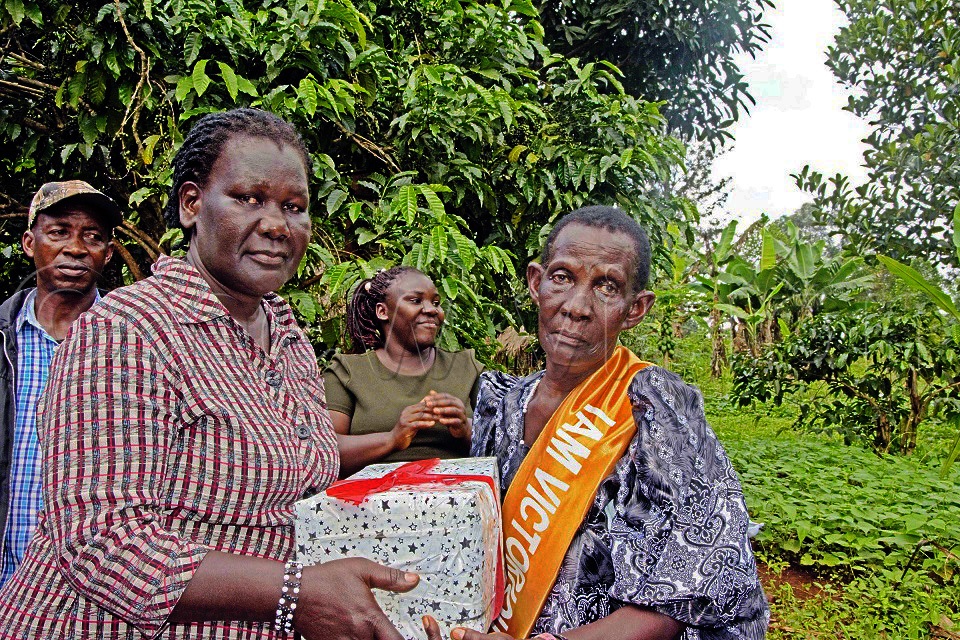Rising land rights violations threaten widows, widowers and orphans in Bunyoro
The problem reared its ugly head in Hoima’s Buhimba sub-county when Maria Birungi, a 69-year-old widow, was violently displaced from her land by her own son, Lawrence Kairagura and grandchildren.
Maria Birungi,69, a resident of Kikoboza village (Left) meeting the officials led by Monica Gurindwa, the program manager for Redeem International to tour the land where she had been evicted. (Photo by Abaanabasazi)
__________________
A shadow of injustice looms over Bunyoro sub-region, where relatives are reportedly increasingly seizing land and property from vulnerable widows, widowers, and orphans.
The problem reared its ugly head in Hoima’s Buhimba sub-county when Maria Birungi, a 69-year-old widow, was violently displaced from her land by her own son, Lawrence Kairagura and grandchildren.
After a four-year legal battle supported by REDEEM, a court ruled in her favour in July 2025, sentencing Kairagura to two years in prison and his grandchildren to six months.
Returning to her land on September 10, Maria recounted the agony of displacement: leaving human rights advocates like Monica Gurindwa of REDEEM International in a race against time.
Mery Birungi, a detective at Buhimba Police Station gifting Maria Birungi 69 years, a resident of Kikoboza village on the right whom they help get back her land. (Photo by Peter Abaanabasazi)
“This both a legal crisis and a cultural pandemic,” Gurindwa said, as her organisation scrambles to handle 18 active cases across Hoima and Kikuube districts.
Silence and ignorance
The problem crystallised in Hoima’s Buhimba sub-county earlier this year when Maria Birungi, a 69-year-old widow, was violently displaced from her land by her own son, Lawrence Kairagura, and grandchildren. After a four-year legal battle supported by REDEEM, a court ruled in her favour in July 2025, sentencing Kairagura to two years in prison and his grandchildren to six months. Returning to her land on September 10, 2025, Maria recounted the agony of displacement:
“For four years, I had no hope. I couldn’t eat properly—sometimes I thought of killing myself. Now, I can finally eat and feel joy.”
Gurindwa called Maria’s case a microcosm of a systemic failure: “Relatives exploit these groups’ voicelessness. Women and children bear the brunt because cultural norms still dictate that they have no right to inherit. Ignorance of succession laws fuels this.”
Cases and fear
REDEEM’s caseload represents the scale of the crisis. The organisation says it is currently handling:
- 5 cases in Hoima District
- 3 cases in Hoima City
- 10 cases in Kikuube District
Yet, many cases go unreported. Mery Birungi, a detective at Buhimba Police Station, said: "We log one land-grabbing case monthly here, but many victims stay silent—either from fear or lack of knowledge.”
Lawyers and advocates sound the alarm
Legal advocate Prisca Atim emphasised the urgency of public education.
“The law protects these vulnerable groups. If you steal their land, justice will catch up. But awareness is key—we must bridge this knowledge gap,” Atim said.
Gurindwa echoed this, noting that Maria’s case was their third successful court victory this year.
“Victims need both legal aid and cultural re-education,” she said, citing systemic biases that strip women of inheritance rights.
Justice cannot wait
As Maria rebuilds her life on her reclaimed land, her story brings hope for those suffering.
Stakeholders have urged:
- Community dialogues to dismantle cultural norms denying women and children land rights.
- Public legal literacy campaigns to empower victims and deter perpetrators.
- Police and courts to prioritise these cases, ensuring perpetrators face consequences.